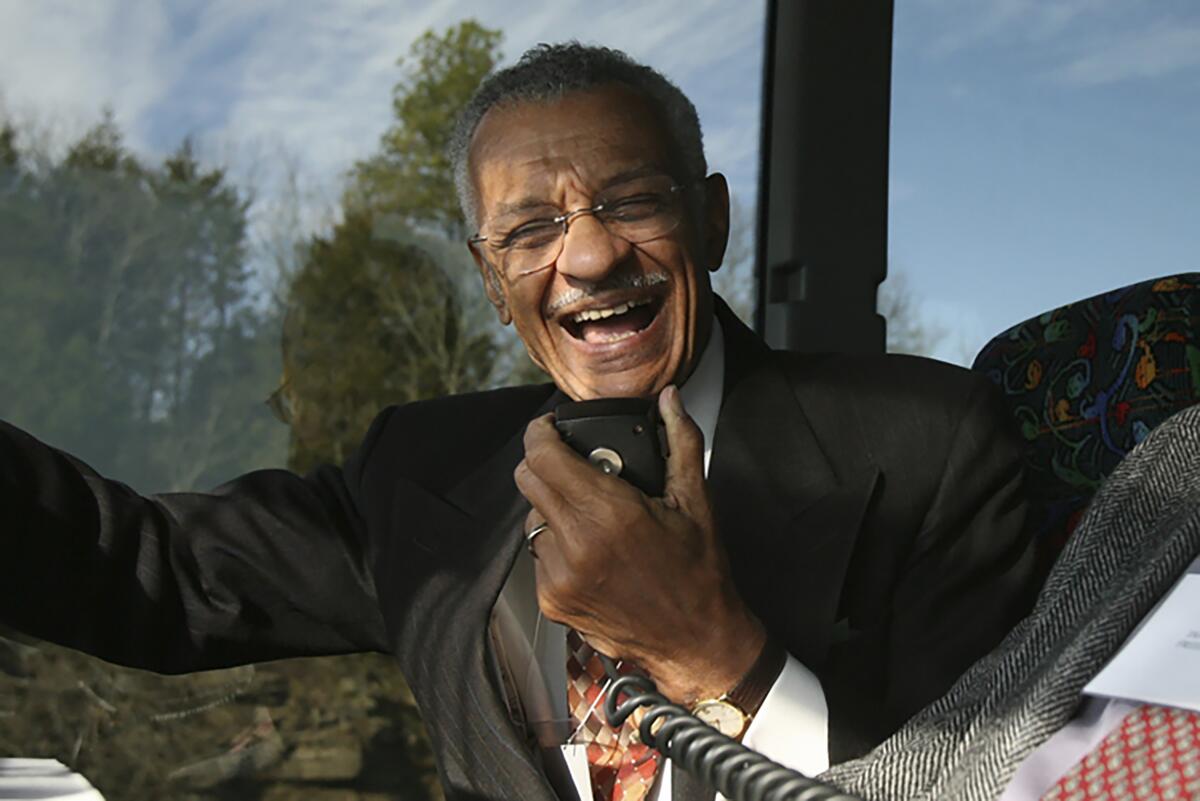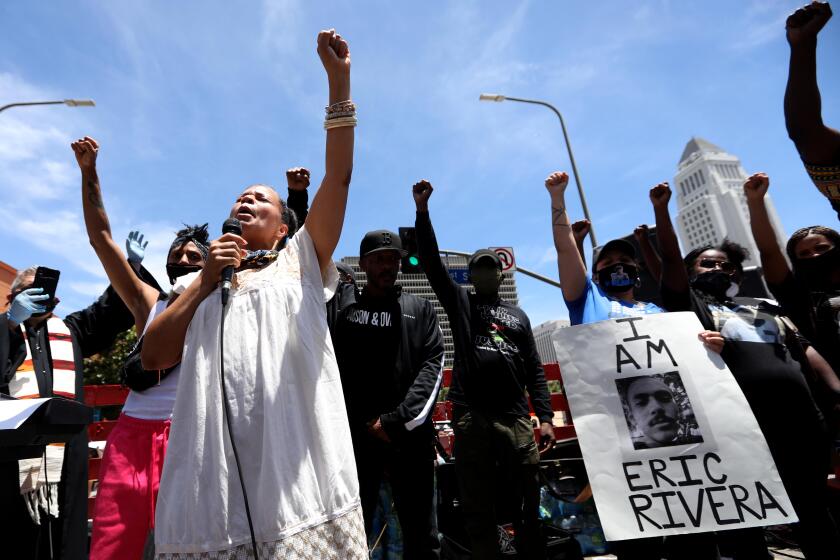C.T. Vivian, civil rights leader who worked alongside Martin Luther King Jr., dies at 95

- Share via
ATLANTA — The Rev. C.T. Vivian, a civil rights veteran who worked alongside the Rev. Martin Luther King Jr. and later led the Southern Christian Leadership Conference, has died. He was 95.
Vivian died at home in Atlanta of natural causes Friday morning, his friend and business partner Don Rivers confirmed to the Associated Press.
His civil rights work stretched back more than six decades to his first sit-in demonstrations in the 1940s in Peoria, Ill. He met King soon after the budding civil rights leader’s victory in the 1955 Montgomery Bus Boycott.
Vivian helped organize the Freedom Rides to integrate buses across the South and trained waves of activists in nonviolent protest. It was Vivian’s bold challenge to a segregationist sheriff while trying to register Black voters in Selma, Ala., that sparked hundreds, then thousands, to march across the Edmund Pettus Bridge in 1965.
“You can turn your back now and you can keep your club in your hand, but you cannot beat down justice,” Vivian declared, wagging his finger at Sheriff Jim Clark. “And we will register to vote because as citizens of these United States we have the right to do it.”
Clark punched him in the mouth.
Vivian stood back up and kept talking as the cameras rolled before he was stitched up and jailed. His mistreatment, seen on national television, eventually drew thousands of protesters, whose determination to march from Selma to Montgomery pressured Congress to pass the Voting Rights Act later that year.
Residents of Selma, Ala., are among critics of a bid to rename the historic Edmund Pettus Bridge, where civil rights marchers were beaten in 1965.
“He has always been one of the people who had the most insight, wisdom, integrity and dedication,” said former diplomat and congressman Andrew Young, who also worked alongside King.
President Obama honored Vivian with the Presidential Medal of Freedom in 2013, saying that “time and again, Rev. Vivian was among the first to be in the action: in 1947, joining a sit-in to integrate an Illinois restaurant; one of the first Freedom Riders; in Selma, on the courthouse steps to register Blacks to vote, for which he was beaten, bloodied and jailed.”
Obama continued: “Rosa Parks said of him, ‘Even after things had supposedly been taken care of and we had our rights, he was still out there, inspiring the next generation, including me,’ helping kids go to college with a program that would become Upward Bound.”
Obama praised Vivian, then 89, for being “still in the action, pushing us closer to our founding ideals.”
With Melina Abdullah and Patrisse Cullors playing key roles, Black Lives Matter has transformed from a small but passionate movement into a cultural and political phenomenon.
The King Center in Atlanta tweeted a tribute: “Rev. C.T. Vivian. Courageous. Brilliant. Sacrificial. A powerfully well-lived life that lifted humanity. We will miss you.”
The Rev. Al Sharpton, who heads the National Action Network, tweeted that Vivian “made this nation and world a better place.” His message ended: “RIP, my friend.”
Vivian had continued to advocate for justice and equality in recent years. Speaking with students in Tennessee 50 years after the Voting Rights Act was signed into law, he explained that the civil rights movement was effective because activists used strategies to make sure that their messages were amplified.
“This is what made the movement; our voice was really heard. But it didn’t happen by accident — we made certain it was heard,” Vivian said.
Breaking News
Get breaking news, investigations, analysis and more signature journalism from the Los Angeles Times in your inbox.
You may occasionally receive promotional content from the Los Angeles Times.
Cordy Tindell Vivian was born July 28, 1924, in Howard County, Mo., but moved to Macomb, Ill., with his mother when he was still a young boy.
As a young theology student at the American Baptist College in Nashville, Vivian helped organize that city’s first sit-ins. Under King’s leadership at SCLC, Vivian was national director of affiliates, traveling around the South to register voters.
Vivian continued to serve in the SCLC after King’s assassination in 1968, and became its interim president in 2012, lending renewed credibility and a tangible link to the civil rights era after the SCLC stagnated for years out of financial mismanagement and infighting.
“There must always be the understanding of what Martin had in mind for this organization,” Vivian said in a 2012 interview. “Nonviolent direct action makes us successful. We learned how to solve social problems without violence. We cannot allow the nation or the world to ever forget that.”
Breaking News
Get breaking news, investigations, analysis and more signature journalism from the Los Angeles Times in your inbox.
You may occasionally receive promotional content from the Los Angeles Times.
Vivian had a stroke about two months ago but seemed to recover, Rivers said. Then, “he just stopped eating,” he said.
Rivers, 67, said he was 21 when he met Vivian at Shaw University in Raleigh, N.C. Back then, he worked as an audio director when Vivian was the dean of the university’s divinity school. The two remained close over the years, and Rivers said he handled the business side of Vivian’s work.
“He’s such a nice, gentle, courageous man,” Rivers said, adding that the reverend wasn’t in it for the money. “He was always giving, giving, giving.”
More to Read
Start your day right
Sign up for Essential California for the L.A. Times biggest news, features and recommendations in your inbox six days a week.
You may occasionally receive promotional content from the Los Angeles Times.








